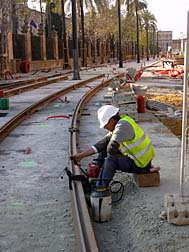 Case in point is David Gibbs, a rail worker with Union Pacific Railroad based in Steelville, Illinois. Employed as a signal maintainer, Gibbs filed a complaint under the Federal Employers' Liability Act (FELA 1908) in US District Court earlier this month alleging that Union Pacific failed to provide him with a safe place to work.
Case in point is David Gibbs, a rail worker with Union Pacific Railroad based in Steelville, Illinois. Employed as a signal maintainer, Gibbs filed a complaint under the Federal Employers' Liability Act (FELA 1908) in US District Court earlier this month alleging that Union Pacific failed to provide him with a safe place to work.Injured on the job, Gibbs alleges that his employer failed to provide him with adequate mechanical assistance to perform his duties, failed to assign adequate manpower, required him to toil in an area that presented unsafe footing, and had subsequently failed to inspect and maintain proper footing in the work area to which he was assigned.
No one is disputing the fact that working on the railroad can be dangerous work—which is why the Federal Employees Liability Act was enacted by Congress in 1908. The rate of death, and injury suffered by rail workers served as the catalyst for that legislation. While train travel has been romanticized over the years and has been relegated more towards tourism than long-distance business, or personal travel (overtaken by the airline industry), the task of maintaining the engines, cars and tracks is just as grueling and laced with risk as it was 100 years ago. And while FELA might be celebrating its centennial this year, a hundred years has only served to heighten the risks, not mitigate them.
For there are so many other risk factors inherent with work in today's rail industry, that the fathers of FELA could not have imagined 100 years ago—a time when, for example, asbestos was just beginning to emerge as something that wasn't particularly good for you.
These days, FELA claims are being made for obvious physical injuries, or even deaths. But claims are also being made for less-obvious health risks and issues, such as exposure to PCBs, diesel fumes, rail dust and dust particulates that could enter the lungs and lead to catastrophic health issues that could affect a family in ways in which it might never recover.
It is incumbent upon any responsible employer to take stock of the risks, and hazards of the workplace, and take steps to protect their workers from those hazards. When such safeguards are not taken, workers have recourse to seek compensation, and FELA is another layer of assistance available to workers hurt, or to the families of those killed on the job.
In Gibbs' case, his injuries were more physical, and more obvious than breathing in bad air filled with chemicals. But the fallout, and impact of his injuries is no less real, or debilitating. The plaintiff is alleging that during the course of his tenure with Union Pacific, his employer continuously required him to engage in excessive, dangerous, constant and repetitive manual labor that left him with serious injuries and damages to his neck, left arm and left elbow. He also claims he injured his lower back, hips and legs while working for Union Pacific on July 24th of last year.
He is seeking damages in excess of $150,000 plus costs.
READ MORE LEGAL NEWS
But you can't tough everything out. A back injury could put you into bed, or a wheelchair for life. The inhalation of asbestos fibers, or other dangerous particulates could leave you gasping for air, and could leave your family in dire straits if you die, or are permanently incapacitated.
All because an employer didn't bother to provide a safe working environment, or take reasonable precautions to protect an employee from harm.
Bugger that. If you're hurt, you're entitled. Swallow your toughness and call your lawyer.
